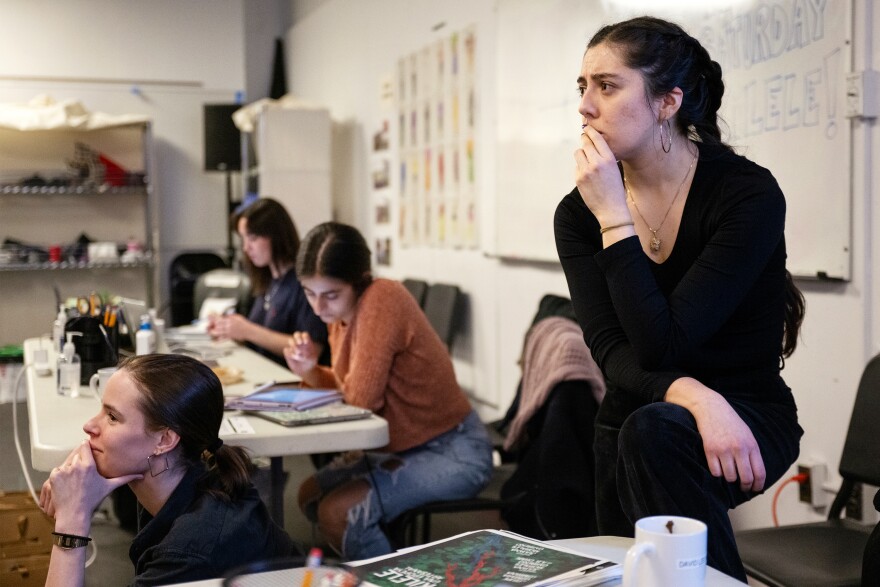In 2002, hundreds of people in the Colombian town of Bellavista in the Bojayá municipality fled as the Revolutionary Armed Forces of Colombia (FARC) guerrillas attacked the area in order to take control of a river that was of strategic interest. The rebel group has engaged in violent conflict since the 1960s, making it Latin America’s oldest guerrilla war.
The 2002 attack later became known as the Bojayá massacre, in which a FARC bomb fell over a church and killed more than 80 civilians.
Two years later, the playwright Felipe Vergara visited the community in Bojayá to do community work and, after spending some years there, he wrote the play, “Kilele: Una Epopeya Artesanal” or “Kilele: An Artisanal Epic.”
Colombian Yale student Juliana Morales Carreño is the director of the play’s production that’s being put on this January through the David Geffen School of Drama.
“There is a moment in the play in which one of the characters starts recollecting a very long list of cities around the world and around history that had suffered [from] massacres in context of war. There are cities [that are] mythological, for example, Troy, and there are real cities from everywhere, a lot of them in Colombia, but from all around the world,” Morales Carreño said.
This scene resonated with Morales Carreño. It made her think about the troubling times that the world is currently facing, she said, such as the war in Gaza and the political strife in the United States.
Art as resistance and historic record

By exploring the true story of the Bojayá massacre through a lens of magical realism, she said the play shines a light on how to find strength in community amid difficult times.
The lead of the play, Viajero, is a peasant displaced by a war of gods in Colombia. The spirit of the Atrato River asks Viajero to journey back to his hometown, home to a large community of Afro-Colombian residents, to help the souls of the people who died in the massacre and did not get a proper funerary ritual.
“The Black communities of the Pacific have real specific and complex funerary rituals that last about a year,” Morales Carreño said. “Because of the massacre and the war, the people who died in the massacre couldn't have the proper funerary rituals. They were buried in a mass grave.”
In having Viajero help the souls of the people who died in the fictional story, Morales Carreño said the play honors the people of Bojayá and those that died in the attack from the rebel group.
A couple years after the massacre, “it was actually very dangerous to talk about it,” Morales Carreño said, because of possible retaliation from the opposing sides of the Colombian Conflict. “The play was written as an early memory tool. [It] was written for the country to hear about this story.”
Highlighting global ties

Bringing the play to New Haven allows people who have never heard about the conflict in Colombia to learn more about it, said Francisco Morandi Zerpa, one of the actors in the play.
“It was a history that I certainly didn't know that much of. So it's exciting for me, for people, you know, even if just a couple of people go home and Google this and understand that that massacre precipitated a whole number of political events and resistance by the people who were left the survivors of the massacre,” Morandi Zerpa said.
It’s also important for Morales Carreño that people become more aware of how a struggle in a single country like Colombia fits in a global context.
“Most people here are so unaware of the strong influence that the U.S. has, in most of countries, policies and histories. I think that's also very important for me,” she said.
According to the Human Rights Watch, the U.S. offered millions in financial aid to Colombia that funded equipment that helped in the investigation of the Bojayá massacre.
Those kinds of global ties are a reminder of how communal solidarity can work around the world, Morales Carreño said.
Ultimately, Morales Carreño said she hopes audiences will learn how a community can find strength and resilience in troubling times.
“I think we have this idea of being [in a] community, that everything is magic and beautiful and fun, but actually to create a real community, you need to be challenged by it,” she said.
The production runs from Saturday, Jan. 25, through Friday, Jan. 31, at Yale’s University Theatre.





